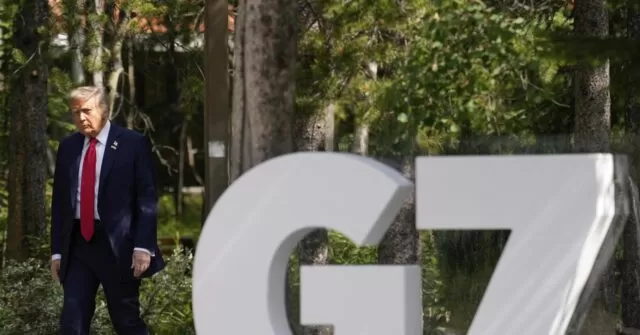President Donald Trump has once again made headlines by refusing to sign the G7’s proposed statement on Iran. The statement, which called for monitoring of Iran’s nuclear activities, did not meet Trump’s expectations as he believes that a total end to Iran’s program of nuclear enrichment is necessary.
The G7 summit, held in Biarritz, France, was meant to address various global issues, including the escalating tensions between the United States and Iran. However, Trump’s rejection of the proposed statement has caused a stir among the other world leaders present at the summit.
In a statement released by the White House, Trump’s National Security Advisor, John Bolton, stated that the President was not satisfied with the G7’s approach towards Iran. He emphasized that Trump’s main concern is to completely halt Iran’s nuclear enrichment program, rather than just monitoring it.
This move by Trump has been met with mixed reactions. Some have praised him for taking a strong stance against Iran, while others have criticized him for not being open to compromise. However, one thing is clear – Trump is determined to protect the United States and its allies from the threat of a nuclear Iran.
The G7’s proposed statement on Iran was seen as a step towards de-escalating tensions between the two nations. It called for the continuation of the 2015 nuclear deal, which was signed by Iran and six world powers, including the United States. The deal aimed to limit Iran’s nuclear activities in exchange for lifting economic sanctions.
However, Trump withdrew the United States from the deal last year, citing that it was “defective at its core.” He also reinstated economic sanctions on Iran, which have severely impacted the country’s economy. Trump believes that the deal did not go far enough in preventing Iran from obtaining nuclear weapons.
In recent months, tensions between the United States and Iran have reached a boiling point. The United States has accused Iran of attacking oil tankers in the Gulf of Oman and shooting down an American drone. Iran, on the other hand, has denied these allegations and has threatened to disrupt oil shipments in the region if its oil exports are completely cut off.
Trump’s refusal to sign the G7’s statement on Iran is a clear message to the Iranian regime that the United States will not tolerate any threats to its national security. He has repeatedly stated that he is open to negotiations with Iran, but only if they are willing to give up their nuclear ambitions.
The President’s tough stance on Iran has been met with support from his allies, including Israeli Prime Minister Benjamin Netanyahu. In a statement, Netanyahu praised Trump for his “strong stance against Iranian aggression.” He also expressed his hope that other world leaders will follow suit and take a firm stand against Iran.
However, some have criticized Trump for not being open to compromise and for potentially isolating the United States from its allies. French President Emmanuel Macron, who hosted the G7 summit, expressed his disappointment with Trump’s decision. He stated that the G7 leaders had reached a consensus on how to handle the Iran issue and that he would continue to work towards finding a solution.
Despite the criticism, Trump remains firm in his belief that a total end to Iran’s nuclear enrichment program is the only way to ensure the safety of the United States and its allies. He has also stated that he is open to meeting with Iranian President Hassan Rouhani, but only if the conditions are right.
In conclusion, President Donald Trump’s refusal to sign the G7’s statement on Iran has once again put him in the spotlight. While some may criticize his decision, it is clear that he is determined to protect the United States and its allies from the threat of a nuclear Iran. Only time will tell if his tough stance will lead to a resolution of the ongoing tensions between the two nations.

